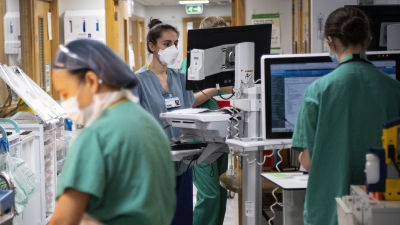Explainer
What happens when nurses take strike action - and how many will be involved?

Nurses around the UK are set to strike next month in an escalating row over pay and working conditions.
It comes amid a wave of industrial action in multiple sectors as people's wages are fast outstripped by soaring inflation.
The Royal College of Nursing (RCN) has announced walkouts from dozens of NHS trusts in England, Wales and Northern Ireland on 15 and 20 December.
Nurses say they have been left feeling "burnt out" working 13-hour shifts without breaks owing to low staffing numbers and demanding paperwork, while also struggling to pay their bills.
Last month, the RCN balloted more than 300,000 of its members in what was the largest ever vote in the union’s 106-year history.
RCN general secretary Pat Cullen said: "Ministers have chosen strike action. Nursing staff have had enough of being taken for granted, enough of low pay and unsafe staffing levels, enough of not being able to give our patients the care they deserve."
The union is calling for a pay rise of 5% above RPI inflation (currently at 14%), but health secretary Steve Barclay has said the demands are unaffordable.
He said the government followed the advice of an independent pay review body when deciding on its 4% pay offer.
So, what exactly can we expect when nurses do go on strike?
What will strike action by nurses look like?
Services deemed “life-preserving” and “emergency-type care” will continue on strike days, a nursing chief said.
The RCN has set out a list of services that will be protected from strike action in the build-up to Christmas. The services are chemotherapy, dialysis, critical care units such as intensive care and high dependency, and neonatal and paediatric intensive care. Other services will be reduced to Christmas day or night duty levels, the union said.
Speaking to BBC Radio Four's Today programme Ms Cullen indicated some cancer services will be exempt, but declined to give detail when asked about scans and checks.
Asked if nurses would be on cancer wards on strike days, she said: “Services such as oncology will be derogated or exempt from any strike action.
"We have a number of services that we are working through at the minute that will be derogated on the day of strike, and we will release that list soon to employers.”
Pressed on scans or cancer checks such as colonoscopies, she said: “Those services that are not considered life-preserving or emergency services will not be derogated. Those that do fall into those particular descriptions will be derogated.”
Want a quick and expert briefing on the biggest news stories? Listen to our latest podcasts to find out What You Need To Know...
Which employers will take part in the strikes?
The majority of NHS employers across the UK have voted to strike over pay, including many of the biggest hospitals in England.
All NHS employers in Northern Ireland will take part, and all bar one in Wales met the relevant legal thresholds.
But the RCN has halted its strikes in Scotland after the government reopened negotiations with workers.
Not including Scotland, the strikes are affecting around 75 NHS organisations, with a full list published by the RCN, which can be read in our article here.
Will all nurses take part in the strike action?
No. If you are a nurse and the voting threshold for strike action to take place wasn't met at your employer then you are not entitled to take part in the strike action.
In fact, even if the voting threshold was met at an employer it does not mean every nurse has to get involved, although they will have the choice to do so.
However, minimum staffing levels will be adhered to on any strike days and determined by the life-preserving care model.
The model ensures that emergency treatment and care still takes place and that patient lives are not put at risk.
Could agency staff be drafted in to cover striking workers?
Agency staff have been asked by the RCN not to cover striking workers, but this doesn’t mean they can’t be used to fill vacancies.
Cabinet Office Minister Oliver Dowden has said the government has contingency plans for dealing with any potential strike by nurses.
"We have well-oiled contingencies in place and the Department of Health is across how we would deal with a scenario like this should it arise," he told Sky News’s Sophy Ridge On Sunday programme.
"We will make sure we prioritise the most essential services - emergency services and so on. But of course there would be an impact as a result of a strike like that."
How did we get here?
Nurses have been embroiled in a row with the government over pay for several months.
The RCN said analysis by London Economics has shown that pay for nurses has declined at twice the rate of the private sector in the last decade.
Nurses’ real-terms earnings have fallen by 6% compared with 3.2% for private sector employees, it was found.
What are nurses demanding from the government?
The RCN is campaigning for a pay rise of 5% above inflation, having argued this year's below-inflation pay award followed years of squeezes on nurse's salaries.
According to the union, the government’s offer left an experienced nurse more than £1,000 worse off in real terms, describing it as "a national disgrace".